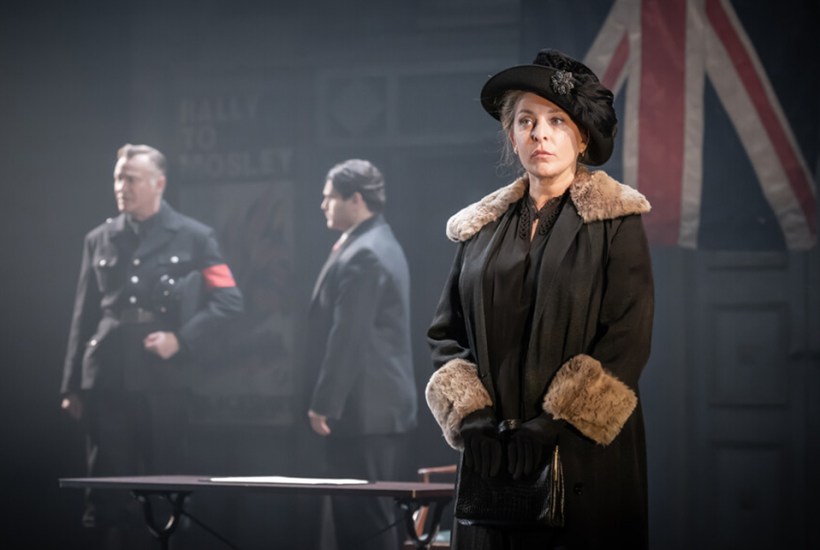These are very odd times. The project of my life – The Merchant of Venice 1936, which sets Shakespeare’s play in East End London during the rise of Oswald Mosley’s Blackshirts – was postponed because of Covid, but is now alive and kicking. It’s kicking hard. We’re on a ten-week tour and I’ve been moved beyond words at the reactions of audiences and critics. Yet for the last week, the production has had to have security men around keeping an eye on things. It’s like a dystopian nightmare. A Jewish actress putting on a play about anti-Semitism which needs to be made secure because of Jew-hating extremists. As one reviewer said: ‘Written in 1600, set in 1936, as relevant today in 2023.’ Ain’t that the truth.
When I was at school, I admired the beauty of the language in The Merchant of Venice, but I hated the play. Aged 12, as one of the only Jewish girls in the class, I was asked to read Shylock out loud when we studied it (terribly, I may add, with no context or discussion about themes, racism or history). Then I had the indignity of my classmates running around in breaktime rubbing their hands together shouting ‘my ducats my daughter’ in a Jewish accent like something out of the Nazi propaganda film Jew Süss.
Shakespeare probably never met Jewish people because there weren’t any in England. The Jews were viciously expelled by Edward I in 1290 and weren’t readmitted until 1656. And yet Shylock is probably the most famous Jewish archetype in the canon of literature and his character had an enormous legacy on how Jewish people are seen by non-Jews. Regardless of what Shakespeare may have intended, Shylock – and his demand for a pound of Antonio’s ‘fair flesh’ for defaulting on a payment – became synonymous with the devilish, money-obsessed Jew. The Merchant of Venice was one of Hitler’s favourite plays and Goebbels oversaw a special adaptation, without Shylock’s ‘Hath not a Jew eyes?’ speech, obviously.
In our production of this difficult, trope-filled play, Shylock still represents The Other, the instigator of the un-Christian vice of money breeding. But she is not a pure villain nor a victim. She’s a woman whose generational trauma and own experiences have brutalised her to the point of becoming the monster she has constantly been accused of being. I based my Shylock on three family matriarchs: my great-grandma Bubbe Annie and two of my great-aunts, ‘Machine-Gun’ Molly and Sarah Portugal (who smoked a cigar and wore a slash of red lipstick). Bubbe Annie escaped the pogroms of the Pale of Settlements and was sent to London to work in Aunty Yetta’s factory, for a penny a week. She slept on the floor of the factory on a rolled-up mattress until Isaac, the boy from the next village and a fleeing Jew himself, married her. Then they lived off Cable Street in one of the slum tenements alongside other Jewish immigrants. Annie called England the Golden Medina – no one wanted to behead or rape you for being a Jew. Then in October 1936 she watched Mosley and his private militia put up poster after poster and nail leaflet after leaflet about the slippery, alien, untrustworthy Jew, who was not welcome on England’s shores.
I was brought up on stories from the Battle of Cable Street, where our play starts and ends. My great-uncle Alf was pushed through the plate-glass windows at Gardiner’s Corner by a Blackshirt and my entire family stood on the front line alongside their neighbours – the Irish, the small Afro-Caribbean community, the English working-class, the dockers and the unionists – who screamed at the fascists and their mounted police protection: ‘You shall not pass. If you come for the Jews, you come for us all.’
And I have to say, ever since Hamas’s terror attack on Israel, with the pogrom-like brutality towards babies, women and girls, including rape and burning alive, I have felt broken. On stage, when I say the lines ‘When you prick us do we not bleed? When you tickle us, do we not laugh? When you poison us do we not die?’, I weep for all the innocent victims, and I know we must stand together against an evil that wants to rip us apart. And the audiences cry too.
Got something to add? Join the discussion and comment below.
Get 10 issues for just $10
Subscribe to The Spectator Australia today for the next 10 magazine issues, plus full online access, for just $10.
You might disagree with half of it, but you’ll enjoy reading all of it. Try your first month for free, then just $2 a week for the remainder of your first year.








Comments
Don't miss out
Join the conversation with other Spectator Australia readers. Subscribe to leave a comment.
SUBSCRIBEAlready a subscriber? Log in